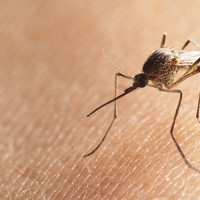
 Anest/iStock/ThinkStock(WASHINGTON) – The Zika virus outbreak is unlikely to spread quickly to the United States, a top health official said Friday.
Anest/iStock/ThinkStock(WASHINGTON) – The Zika virus outbreak is unlikely to spread quickly to the United States, a top health official said Friday.
“Zika is not coming up the coast so you don’t have to worry,” Dr. Anthony Fauci, director of the National Institute of Allergy and Infectious Diseases, said in remarks to the Economic Club of Washington, D.C.
“We’ve not seen a major outbreak” in the continental U.S., Fauci said, adding that the NIH and its counterparts are not taking the issue lightly.
“What we do is prepare for a major outbreak,” Fauci said. “In reality, we believe it is unlikely it will happen.”
The Zika virus is spread to humans through a mosquito bite. Pregnant woman are most impacted by the virus because it can lead to microcephaly in newborns. The birth defect causes babies to be born with abnormally small heads and brains. Microcephaly has been linked to seizures, hearing loss, vision problems, developmental delays and difficulty swallowing.
Symptoms of the virus can last from several days to a week, according to the Centers for Disease Control and Prevention. Symptoms include fever, rash, joint pain and conjunctivitis.
The CDC has issued a travel alert of countries that pregnant women should avoid, which includes Puerto Rico, Brazil, Mexico, the U.S. Virgin Islands, Ecuador, Haiti, Guatemala, Dominican Republic and Barbados.
Fauci said the Food and Drug Administration is looking into restricting those who can participate in donating blood due to the outbreak but he isn’t aware of any other major precautionary steps being prepared by the government, such as screening people at airports.
Right now the best way to combat the virus is to control the mosquitoes that carry and transmit the virus, he said. Individuals can also use insect repellent and wear long sleeves and pants to protect themselves from being bit.
Fauci said it would take “a few years” for a vaccine to be widely available due to the regulatory process, although the testing phase could begin by the end of the year.
“I don’t expect the widespread use of an approved regulatory vaccine for at least a few years,” he said.
Copyright © 2016, ABC Radio. All rights reserved.















